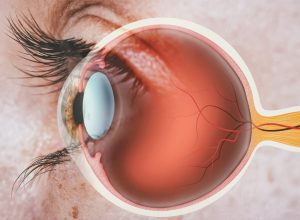Dr. Katia Taba, Board-Certified Ophthalmologist and Retinal Specialist
 The eye, a marvel of intricate design, is susceptible to various conditions affecting its delicate structures. Among these, glaucoma and disorders of the retina, macula, vitreous, and related structures pose significant threats to vision.
The eye, a marvel of intricate design, is susceptible to various conditions affecting its delicate structures. Among these, glaucoma and disorders of the retina, macula, vitreous, and related structures pose significant threats to vision.
Glaucoma, often termed the “silent thief of sight,” manifests as increased pressure within the eye, damaging the optic nerve. This condition gradually steals peripheral vision, progressing stealthily until noticeable vision loss occurs. With its insidious nature, early detection through regular eye exams becomes imperative. Treatment primarily focuses on lowering intraocular pressure to preserve remaining vision. Medications, laser therapy, or surgical interventions aim to alleviate pressure, reducing the risk of irreversible vision impairment.
Retinal disorders encompass various conditions affecting the retina, a vital layer of tissue at the back of the eye responsible for converting light into neural signals for vision. Disorders like age-related macular degeneration (AMD) and diabetic retinopathy are prevalent. AMD alters central vision, impacting tasks like reading and recognizing faces, while diabetic retinopathy stems from diabetes-related damage to retinal blood vessels. Treatments range from medications to surgical procedures, aiming to slow progression and preserve visual acuity.
The macula, a tiny but crucial part of the retina, allows detailed central vision. Conditions like macular degeneration or macular holes impair this area, leading to blurred or distorted central vision. Treatment options vary, including injections, laser therapy, or surgery, aiming to restore or prevent further loss of central vision.
The vitreous, a gel-like substance filling the eye, can develop disorders such as vitreous detachment or floaters. Vitreous detachment occurs when the gel separates from the retina, causing floaters or flashes. While usually benign, sudden onset or severe symptoms necessitate immediate medical attention to rule out retinal tears or detachment.
Advanced technologies have revolutionized the treatment landscape for these conditions. Laser therapy offers targeted precision, such as in laser trabeculoplasty for glaucoma or photocoagulation for retinal disorders. Intravitreal injections, delivering medication directly into the eye, have become a cornerstone in managing retinal diseases like AMD or diabetic retinopathy.
Surgical interventions, ranging from traditional to minimally invasive procedures, play a crucial role in treating severe cases or complications. Surgeries like vitrectomy for vitreous disorders or trabeculectomy for glaucoma aim to alleviate symptoms and prevent further vision loss.
Early diagnosis and timely intervention significantly impact the prognosis of these eye conditions. Regular eye exams remain pivotal, allowing healthcare professionals to detect subtle changes and initiate prompt treatment, potentially preserving vision and quality of life.
Moreover, ongoing research endeavors continually push the boundaries of treatment. Advancements in gene therapy, stem cell research, and artificial intelligence-aided diagnostics hold promise in revolutionizing treatment approaches and possibly restoring vision in previously incurable conditions.
In conclusion, glaucoma and disorders affecting the retina, macula, vitreous, and related eye structures pose significant threats to vision. However, with early detection, advancements in treatments, and ongoing research, there is hope for better management and potential cures. Vigilance, regular eye check-ups, and access to cutting-edge therapies are vital in safeguarding one of our most precious senses—vision.
Katia E. Taba, MD, is the board-certified ophthalmologist and retina specialist at Personalized Retina Care of Naples in Naples, Florida. Dr. Taba treats macular degeneration, diabetic retinopathy, macular holes, eye floaters and flashes, and other serious eye problems that can interfere with sight or steal vision without treatment. Patients know Dr. Taba as an extremely friendly and welcoming care provider who maintains great professionalism at all times.
Dr. Taba is a board-certified ophthalmologist in both her home country of Brazil and in the United States. She earned her medical degree at a leading medical school in Brazil and continued specialized vitreoretinal surgery training in Florida, New York, California, Louisiana, and many other locations in the U.S. Dr. Taba trained under the leading experts in the field of ocular disease.
Dr. Taba’s extensive training and experience include many years as both a clinician and academician. She entered solo practice as a way to deliver consistently great care in a world where the environment and health care policies are always changing.
Dr. Taba wants to make sure that patients always get the most accurate diagnosis and most effective treatment, so she uses only the latest, state-of-the-art diagnostic equipment. Dr. Taba is the first retina specialist on the southwest coast of Florida to have wide-angle viewing imaging. Dr. Taba also makes sure that injections and treatments are pain-free so patients can always expect a comfortable experience.
Retina Group of Florida
If you are experiencing any changes in your eye health, whether it is blurry vision, pain, impaired vision, or any other visual irregularities, you should see an ophthalmologist right away. The earlier a disease is detected, the better the outcome and treatment options are for you. You will find a friendly and warm environment at Retina Group of Florida.
Please call (239) 325-3970 today to schedule your eye exam. When necessary same day appointments can often be accommodated.
Katia E. Taba, M.D., Ph.D.
3467 Pine Ridge Rd #103
Naples, Florida 34109
239-325-3970
www.retinagroupflorida.com







